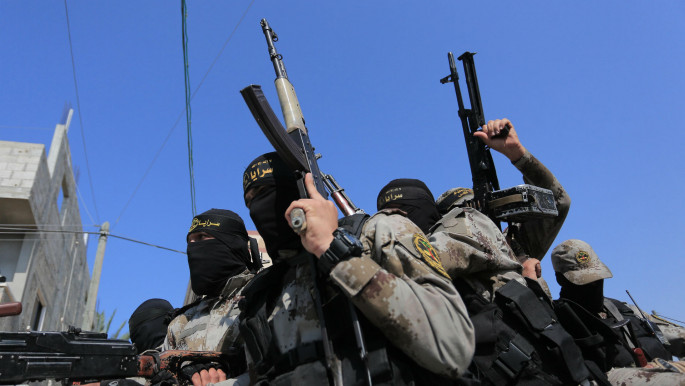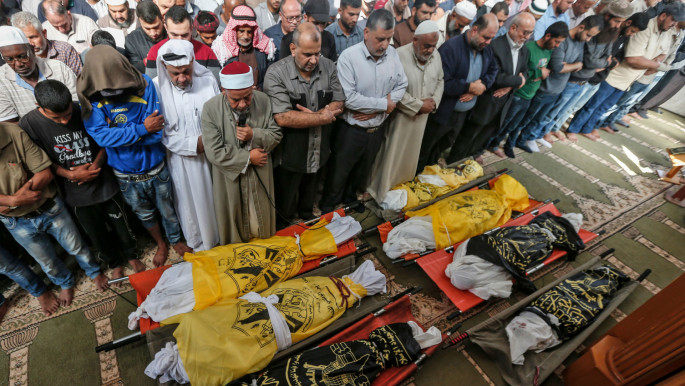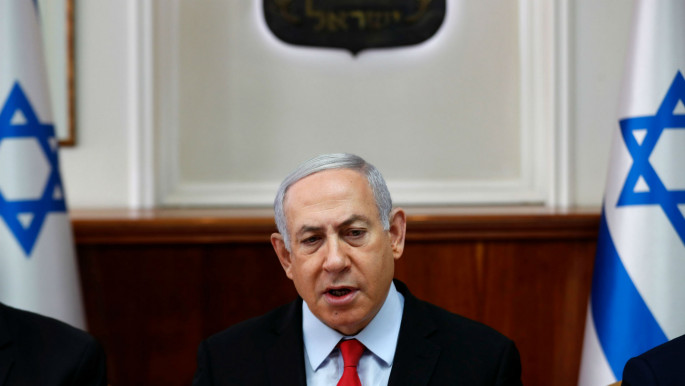Why is Israel waging war on Islamic Jihad?
Yet his death, the first high-profile killing of an Islamic Jihad figure since the 2014 war, could have serious implications - reconfiguring power relations in Israel's deadlocked post-election process while impacting Gaza's own political balance.
More than 34 Palestinians, including six children, have been killed by Israeli airstrikes since the targeted killing, until a fragile truce was agreed on Thursday.
Islamic Jihad in turn responded to Abu al-Ata's assassination by firing over 450 rockets into Israel, making it the heaviest round of fighting in recent months.
For the first time in a decade, Israel bombed Gaza while explicitly saying it was not targeting Hamas, drawing a distinction between the two groups.
Hamas also chose to stay out of the latest round of violence.
But what did Israel hope to achieve by raising the spectre of war in Gaza, and why was it only targeting Islamic Jihad?
 |
For the first time in a decade, Israel bombed Gaza and explicitly said it was not targeting Hamas, drawing a distinction between the groups |  |
Islamic Jihad - a rising threat?
Founded in 1981 with the aim of establishing an Islamic Palestinian state in the West Bank, Gaza and all of what is now Israel, Islamic Jihad is the second largest militant group in Gaza after Hamas.
The group rose through the Muslim Brotherhood network in Palestine before developing as a distinct organisation influenced by Iran's Islamic Revolution.
 |
|
| Read more: Baha Abu al-Ata: Who was the secretive Islamic Jihad leader assassinated by Israel? |
Tehran supplies the group with training, expertise and money, with PIJ possessing long range missiles capable of striking Tel Aviv and a significant rocket arsenal.
Islamic Jihad also has leadership based in Beirut and Damascus, with Israeli missile strikes reportedly targeting senior leader Akram al-Ajouri in Syria shortly after the assassination of Abu al-Atta in Gaza.
Vastly outnumbered by Hamas, the group plays no role in the political organisation of Gaza, limiting its objectives to military confrontation with Israel.
Hamas has traditionally maintained a delicate power balance with Islamic Jihad in Gaza, wary not to crack down on the group for fear of public ire and participating together in previous military confrontations with Israel.
But recent unilateral military actions from Islamic Jihad have challenged this fragile status quo, with rocket strikes and sniper fire targeting Israel without Hamas' approval as Gaza's rulers attempt to maintain a mutual ceasefire following a deadly escalation in May.
Abu al-Ata is thought to have been key in organising such attacks.
 |
Hamas has traditionally maintained a delicate power balance with Islamic Jihad in Gaza, wary not to crack down on the group for fear of public ire |  |
Balance of power
In extraordinary scenes in early September, Israeli Prime Minister Benjamin Netanyahu was whisked off stage during an election campaign event in Ashdod, southern Israel, after rockets were fired from Gaza during a live-streamed Likud event.
The attacks, which damaged the Israeli premier's 'Mr Security' image, were reportedly ordered by Abu al-Ata, with a furious Netanyahu trying, but failing, to pressure the security establishment to order his immediate assassination.
Similar rocket attacks thought to be organised by Abu al-Ata's faction targeted a Sderot music festival in August causing widespread panic, while a volley of missile fire in early November, the first in several months, led to retaliatory Israeli strikes on Gaza.
"Israel's security system has noticed this increasing divergence between Hamas and Islamic Jihad, and its assessment that Abu al-Atta has had a role in it is what has brought him into Israeli sights, quite literally," Hugh Lovatt, a policy fellow at the European Council on Foreign Relations, told The New Arab.
In recent months, Hamas has been trying to work out a pragmatic, transactional relationship with Israel to allow for short-term security in Gaza, Lovatt says, maintaining an Egyptian brokered ceasefire that ended large-scale violence in May.
 |
|
| Eight members of a Palestinian family were killed by an Israeli airstrike. [Getty] |
That round of conflict saw Israeli forces bomb more than 300 targets in Gaza killing at least 25 Palestinians, with Hamas, Islamic Jihad, and other factions firing over 600 rockets at Israel, with four Israelis killed.
The fighting ended following an Egyptian brokered ceasefire, which was supposed to see Israel allow Qatari cash transfers and fuel into the Strip, as well as facilitating projects to redevelop infrastructure there in later phases.
Hamas' delicate balancing act requires satisfying the mediators of the ceasefire while also maintaining the group's image as defenders of Gaza and the Palestinian resistance, sometimes even turning a blind eye to rocket fire to pressure Israel into further concessions.
Islamic Jihad, however, has not fully abided by this policy of stabilisation.
"In the past when Hamas was close to reaching an understanding with Israel, Islamic Jihad has initiated action to undermine it," Lovatt told TNA.
"Islamic Jihad has been playing a spoiler role in this regard, with an increase in rocket fire, or at least rocket fire done without coordination with Hamas".
In a bid to bring Islamic Jihad into line, Egypt invited senior leaders, including Abu al-Ata, to Cairo last month to meet with intelligence officers.
Egypt also released 80 Islamic Jihad members it had imprisoned in a bid to ensure compliance.
"The challenge for Hamas is how to keep Islamic Jihad on board," Lovatt says. "If Hamas starts moving into a more transactional relationship with Israel, can they keep the group in line?"
"Over the longer term it will be interesting to see if Islamic Jihad feels it has been betrayed or sold out by Hamas."
 |
Israel's actions in Gaza are driven by a domestic agenda which reinforces the fact that military operations have political capital in Israel, whereas lifting the blockade does not -Tareq Baconi, International Crisis Group |
 |
Is it all about Israeli elections?
The killing of Abu al-Ata comes at a sensitive time in Israel, as Netanyahu heads a caretaker government after two inconclusive elections and twice failing to form a coalition government.
Despite Islamic Jihad's disruptive spoiler role in Gaza, some analysts say the timing of the targeted killing of Abu al-Ata has clear benefits for Netanyahu as coalition talks remain deadlocked.
"The timing is not coincidental," Tareq Baconi, from the International Crisis Group think tank, told The New Arab.
"It's always the case that military offensives in Gaza have political weight for Israeli leaders".
Israel's president has given the task of forming a government to Blue and White party leader Benny Gantz, after Netanyahu failed to piece together a coalition after a month of talks.
While both men support the idea of a unity deal, they have disagreed over who should lead it.
 |
|
| Read more: Official election results in Israel confirm political deadlock |
Gantz could only form an alternative minority coalition with other centre-left parties, and the support of the Joint List - a grouping of Palestinian Israeli lawmakers and the third largest bloc in Israel's parliament.
Likud and right-wing allies have long sought to smear the Joint List, with Netanyahu telling a conference hours before Abu al-Atta's assassination that having them in government would be a "threat to Israel's security".
A national security crisis, whether real or perceived, is useful leverage to justify a national unity government with Blue and White.
"There are several advantages to military action in Gaza for Netanyahu," Baconi says.
"It makes the possibility of a Netanyahu-Gantz coalition more likely, and more importantly breaks ranks between Gantz and the Joint List."
The brazen targeted killing, and subsequent barrage of airstrikes, also serves to "neutralise" Avigdor Lieberman, according to Baconi.
The hardline former Israeli defence minister, seen as a potential election kingmaker, resigned last November in protest at a truce deal to end a bout of fighting in Gaza, and has since the first election labelled Netanyahu as 'soft' on Gaza.
"One could certainly say that this sort of crisis will for now strengthen Netanyahu's hand, as he can talk up his security credentials and use this to demonstrate his toughness, while at the same time compel Gantz to enter into a national unity government on his terms," Lovatt says.
Ultimately, though, Israeli military operations in Gaza come at great human cost to the two million Palestinian residents of the coastal enclave, with the Israeli 'calm for calm' approach to the territory doing little to alleviate the suffering caused by the 12-year blockade amid negligible concessions by Israel.
"Israel's actions in Gaza are driven by a domestic agenda which reinforces the fact that military operations have political capital in Israel, whereas lifting the blockade does not," Baconi says.
"The only way to stabilise Gaza is to lift the blockade."
Follow him on Twitter @CharlieCHoyle



